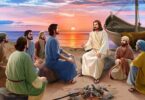Ascension Sunday (Year C)
Scripture: Acts 1:1-11; Ps. 47:2-3, 6-7, 8-9; Eph. 1:17-23; Lk. 24:46-53
Today we celebrate the Solemnity of the Ascension of the Lord, one of the most important moments in the life of Jesus and in the life of the Church. This solemnity commemorates not only Jesus’ return to the Father but also the fulfillment of His earthly mission and the beginning of our mission. It is a feast that invites us to reflect deeply on the meaning of Christ’s glorification and His continued presence among us through the Holy Spirit.
Jesus, having completed the mission entrusted to Him by the Father, now enters into the heavenly sanctuary. As we heard in the first reading from the Letter to the Hebrews (Heb 9:24–28; 10:19–23), “Christ did not enter a sanctuary made by hands, a mere copy of the true one, but heaven itself, now to appear in the presence of God on our behalf.” The Ascension is not simply a departure; it is an entry into the fullness of glory, where Christ now intercedes for us as our eternal High Priest. He stands before the Father, bearing the wounds of His Passion as a sign of His love and as an offering for our redemption.
By ascending, Christ did not abandon humanity. On the contrary, He opened the gates of heaven, which had been closed since the fall of Adam and Eve. He is the first human person to enter heaven after sin had severed that bond. Through Him, we are now given access to the Father. As Hebrews reminds us, “We have confidence to enter the sanctuary by the blood of Jesus… let us approach with a sincere heart and in full assurance of faith.” Christ’s Ascension gives us hope, a reason to persevere, and an assurance that where He has gone, we too may follow.
Each of the evangelists refers to this great event. Matthew ends his Gospel not with a description of Jesus being taken up but with the missionary mandate: “Go therefore and make disciples of all nations” (Mt 28:19). Mark briefly records: “So then the Lord Jesus, after he had spoken to them, was taken up into heaven and sat down at the right hand of God” (Mk 16:19). John does not explicitly describe the Ascension but alludes to it in Jesus’ words to Mary Magdalene: “I am ascending to my Father and your Father” (Jn 20:17). Luke alone gives a detailed description in both his Gospel and the Acts of the Apostles. In Luke’s Gospel (Lk 24:50–53), Jesus blesses His disciples and is carried up to heaven, and they return to Jerusalem full of joy. In Acts (Acts 1:1–11), we hear of Jesus’ final instructions, His being lifted up before their eyes, and the appearance of angels who assure the disciples that He will return in the same way.
This joyful response of the disciples after the Ascension might surprise us. One might expect sadness or confusion. But their hearts were full of joy because they had received the promise of the Holy Spirit. Jesus had told them not to leave Jerusalem but to wait for the gift of the Spirit: “You will receive power when the Holy Spirit comes upon you, and you will be my witnesses” (Acts 1:8). They knew that although Jesus had gone to the Father, He would send the Spirit to dwell in them, to guide them, strengthen them, and continue His mission through them.
The Ascension, then, is not about absence—it is about presence in a new and more powerful way. Christ is no longer limited to time and space. He is present in His Word, in the sacraments, in the Church, and in the hearts of believers. As the Catechism teaches, “Jesus Christ, having entered once for all into the heavenly sanctuary, intercedes constantly for us as the mediator who assures us of the permanent outpouring of the Holy Spirit” (CCC 667).
Moreover, the Ascension turns our gaze toward the future. The angels told the apostles: “This Jesus, who has been taken up from you into heaven, will come in the same way as you saw him go into heaven” (Acts 1:11). The Church lives in this hope—awaiting the glorious return of the Lord. Every Eucharist we celebrate is an act of waiting and watching: “We proclaim your death, O Lord, and profess your Resurrection until you come again.” The season of Advent, too, begins each liturgical year by focusing on Christ’s second coming. Without this hope, our discipleship would be empty. But with this hope, we live in joyful expectation.
This feast also reminds us of our responsibility as members of the Church. The mission of Jesus now continues through us. He has entrusted His Gospel to us, not just to preserve it, but to proclaim it. The first step in this mission is to be filled with the Holy Spirit. Just as the apostles were told to prepare themselves for the coming of the Spirit, so too we are called in this week before Pentecost to open our hearts and pray: “Come, Holy Spirit, fill the hearts of your faithful.”
The apostles, after the Ascension, did not sit idle. They gathered together in prayer, they awaited the Spirit, and then they went out into the world. With the power of the Spirit, they preached, healed, suffered, and rejoiced. The Church is born from the Spirit, and it continues to live by the Spirit.
We may feel, at times, like the apostles, longing to see the Lord physically. Yet their joy after the Ascension teaches us a deep truth: we can be joyful because the Lord is not far away. He is with us. As the Letter to the Hebrews reminds us, “He lives forever to make intercession for us” (Heb 7:25). He knows our weaknesses, our pain, our struggles, and He will never leave us alone.
Let us then live in joy, in mission, and in hope. Let us prepare our hearts for the coming of the Holy Spirit. With His power, we can overcome all obstacles and be faithful witnesses of the Risen and Ascended Lord.






